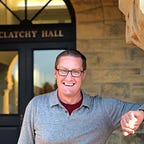Facebook broke news. Now it’s time to follow the Pottery Barn rule*
Facebook broke the news.
The debate over intent and process and impact on elections rages on, but we’ve arrived at the parking lot at the end of a long road.
News — particularly local news — is imperiled, and the solutions for sustainable ways forward are still few and far between.
Facebook is the de facto gateway to news for millions of Americans. It is the most successful advertising platform in the history of humankind. The ad product is fueled by the most granular data possible on its 2 billion plus users, but the platform itself came to be so addictive by providing users with Mark Zuckerberg’s vision of a “perfect personalized newspaper.” That personalized newspaper is certainly built on status updates from grandma and pictures of your high school friends’ kids, but it is often made sticky by being a gateway for professional journalism content.
Facebook has put news organizations through the ringer in recent years.
It asked newsrooms to post links to stories to Facebook pages and encouraged them to rack up hundreds of thousands or millions of likes. This made Facebook a great place to get news for consumers and ended the need to look at publishers’ own homepages or mobile apps.
Then Facebook decided that wasn’t enough and said slow page loading on phones means publishers should host their content on Facebook’s servers through Instant Articles. This meant a lower revenue share on a per article basis.
Next, video became the hot buzz and Facebook tried to move news organizations toward producing short-form videos specifically for its platform. This drove eyeballs away from high-CPM videos they could monetize on the publishers’ owned platforms.
Next up, Facebook Live. The company asked publishers to create realtime content and dish it up to Facebook users inside the walled garden with little or no route toward monetizing it.
Now? Now, within two weeks — the greatest ad targeting power of all time has announced and quickly implemented a plan to sack the amount of news on the platform all together.
Then it turned around and said it would introduce more local news.
My. Head. Is. Spinning.
Facebook is now the guardian of American journalism.
Please, recoil at that phrase for a minute. Think about how it bothers you. Soak in the idea that one publicly-traded company controls the news ecosystem.
The company has done what is best for its business, advertisers and shareholders. But has it done right by journalists or the communities they serve?
Perhaps it wasn’t through bad intentions, but the damage is done. Time for the Pottery Barn rule to come into play.
You break it, you own it.*
Facebook seems unwilling, or perhaps unable, to level with the industry. It vacillates so quickly that news organizations are left to spend most of their “strategy” time figuring out how best to capitalize on Facebook’s latest seemingly-random decision.
It’s time for transparency.
Facebook is a private business and fully within its rights to do whatever it wishes. But now that it has achieved the goal of being that perfectly personal newspaper, company leaders have a responsibility beyond Wall Street.
It has a responsibility to set a path forward that is easy to understand and helps news consumers build trust and news creators build sustainable businesses.
Here at Stanford, much time and energy is dedicated toward deciding if Facebook is a platform or a publisher. The discussion seems to divide into two camps.
Facebook employees and loyalists insist it is a technology company.
Journalists and content creators believe it is indeed a media company.
While that argument may never be won by either side, Facebook should recognize its role in a society that thrives on accurate, quality information.
The company’s largest rival Google is investing deeply in the news space — beyond just flashy hires and empty promises.
It has launched the Google News Lab, supports the Report for America project, teamed up with ProPublica and more. The company seems to be taking proactive steps to help support the journalism ecosystem. Facebook has also taken some steps to help journalism, but they seem more token in nature.
Google’s moves could serve as inspiration for Facebook to do more beyond its own walls to help support a struggling part of our democracy.
John S. Knight Senior Research Fellow Frederic Filloux argues Facebook is in the process of abdicating its news throne and the journalism industry should find a way to rule its own kingdom.
Consider us notified. Facebook is done with journalism. It will happen, slowly, gradually, but the trend is here. In this context, the email… by Campbell Brown, Facebook’s head of news partnerships, who states “news remains a top priority for us,” rings hollow.
Perhaps getting Facebook out of the news diet may be the best thing for all of us. But once a habit is formed, it is pretty hard to break. Will average news consumers who once picked up the paper or watched the local TV news but forewent it for the perfect Facebook newspaper ever find their way back to journalism about their community?
What happens next is an open question. But failure on the part of the platforms, the media or consumers isn’t an option.
* Pottery Barn doesn’t actually have this rule — it’s an American colloquialism, forgive me for the license to make my point.
Don Day is a 2018 Stanford John S. Knight Fellow. He has twenty years experience in media — leading teams, producing award-winning journalism and innovating in the digital journalism space. He currently is the publisher of BoiseDev.com.
